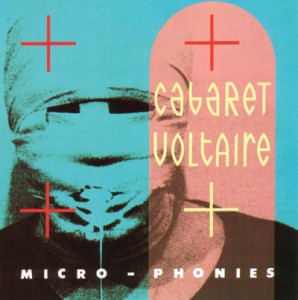CABARET VOLTAIRE: MICRO-PHONIES (1984)
1) Do Right; 2) The Operative;
3) Digital Rasta; 4) Spies In The Wires; 5) Theme From Earthshaker; 6) James
Brown; 7) Slammer; 8) Blue Heat; 9) Sensoria.
If you have not had the chance to grow up with
the Three Stooges (and how could I, a simple Soviet kid, ever have had such a
chance?), you might find it hard to get adjusted to their crude brand of humor
later on in life. Consequently, even if Micro-Phonies,
their 87th short produced in 1945 with an already ailing Curly, tends to be
highly rated by veteran fans, nothing guarantees that it will be equally warmly
embraced by a new gen...
...oh, hang on, we're actually talking Cabaret
Voltaire here, not the Stooges. So anyway, if you have not had the chance to
grow up with Cabaret Voltaire (and although I, a simple Soviet kid, might have
had that chance if my parents were huge New Wave fans, they were not, so I
hadn't), you might find it hard to get adjusted to their rough brand of
electrofunk later on in life. Consequently, even if Micro-Phonies, their 6th proper LP produced in 1984 with three new
percussionists replacing Alan Fish, tends to be highly rated by veteran fans,
particularly those reared on the video for ʻSensoriaʼ, nothing guarantees that
it will be equally warmly embraced by those of us who tend to be curious about Cabaret Voltaire rather
than giddily excited.
But yes, ʻSensoriaʼ is a pretty damn good
«spooky dance-pop» number for 1984, maybe one of the most successful updates of
Kraftwerk's Man Machine vibe for the
Age of Dance. Mystery bassline, disturbing synth bubbling, and Mallinder's
breathy vocals singing about sin, temptation, and "senses reaching fever
pitch". Frankly, this is not a very good line: Cabaret Voltaire are a cold
band par excellence, and no matter
how many paranoid overdubs they make, "fever pitch" is never a thing
I could associate with any of their songs. Across these six minutes, something is clearly being reached by
the senses, but it ain't fever pitch. I'm still trying to figure it out.
One of the tracks carries the name of ʻJames
Brownʼ, as if to acknowledge the debt that these guys owe to their funky
forefathers, but yet again, James Brown makes hot music, whereas this song, like everything else in the catalog,
is freezing cold, so we should all agree to retitle it ʻAnti-James Brownʼ and
then play it simultaneously with ʻSex Machineʼ so as to annihilate all sonic
matter in the world. It does feature the catchiest bit on the album — the
mantra of "everything devoured, I learn to hold my will power"
repeated over and over against a cheerful brass riff — but I have no idea what it means or how it
relates to The Godfather Of Soul.
However, my personal favourite track on the
record is ʻSpies In The Wiresʼ, maybe one of the most atmospheric things in the
CV catalog — and I mean successfully
atmospheric, on a true sensual level rather than on the level of intellectual
analysis. Subjective opinion, yes, but somehow it all clicks together,
particularly the cavernous synth overdubs and the "like spies in the wire,
dark eyes in the wire" chorus. This
track, I think, could actually spook away impressionable little kids, so keep
that in mind. Other people have their own favorites, like the faster-paced
ʻOperativeʼ or the perverted vibe of ʻBlue Heatʼ, but in the end it does not
matter, because all the songs end up using the exact same vibe — now completely
updated and refined for the general dance environment, without sacrificing an
ounce of the band's ideology. Even the aptly titled ʻDigital Rastaʼ, which, as
you can guess, is an attempt to synthesize their standard sound with elements
of reggae, still ends up sounding like the soundtrack to a movie about chasing
innocent bystanders in dark corridors and sucking their souls out. (But don't
worry, the chase is always better than the catch for Mallinder and Co.).
I have no idea if this is «better» than The Crackdown, but at the very least, Micro-Phonies is not any less inspired
— which does not imply that either of the two is a work of genius, but yes, at
least as late as 1984, Cabaret Voltaire continued to be on some sort of cutting
edge. And the album title might suggest that they weren't taking themselves too
seriously, either, which is always a good thing.

No comments:
Post a Comment
Note: Only a member of this blog may post a comment.